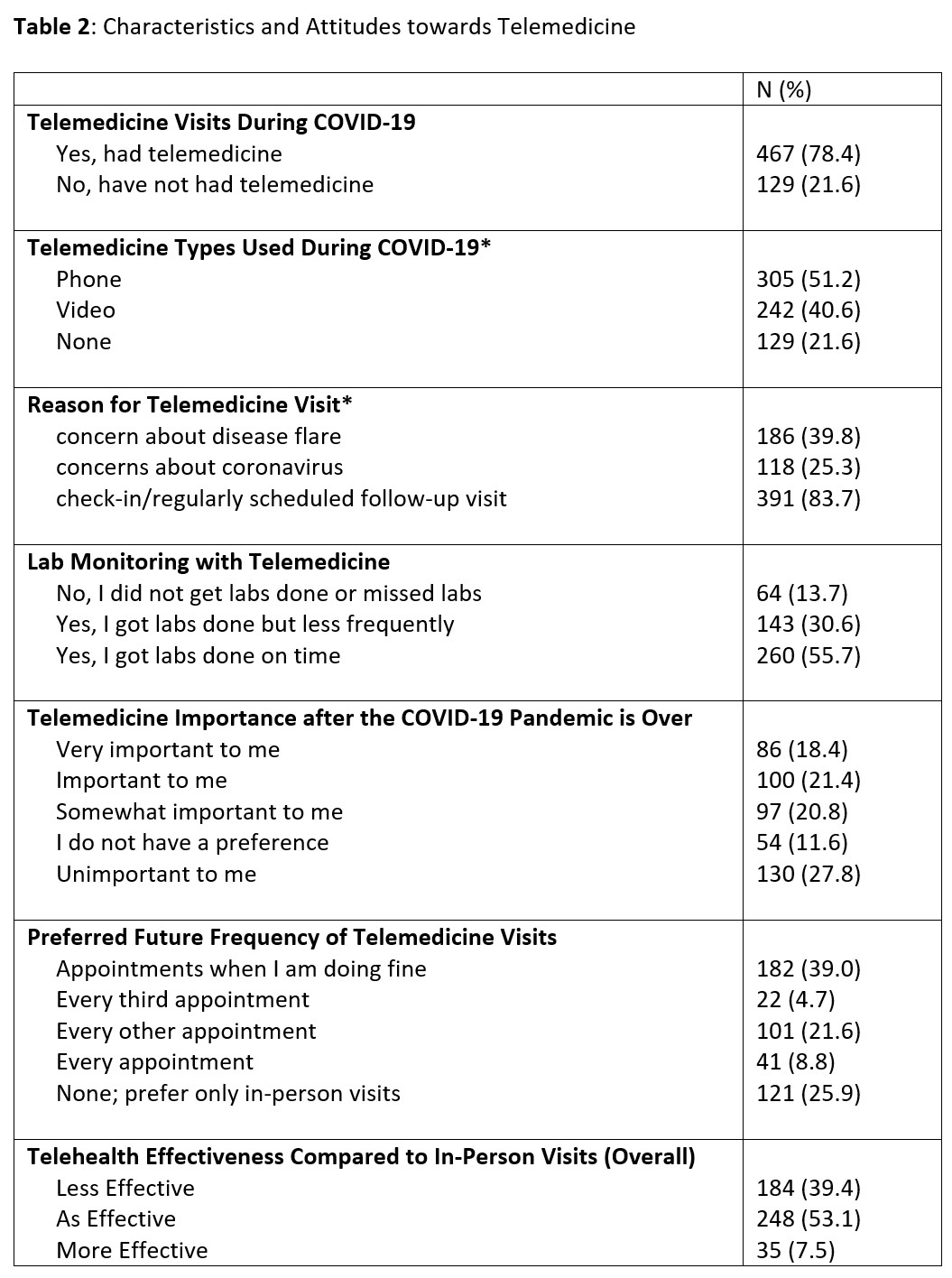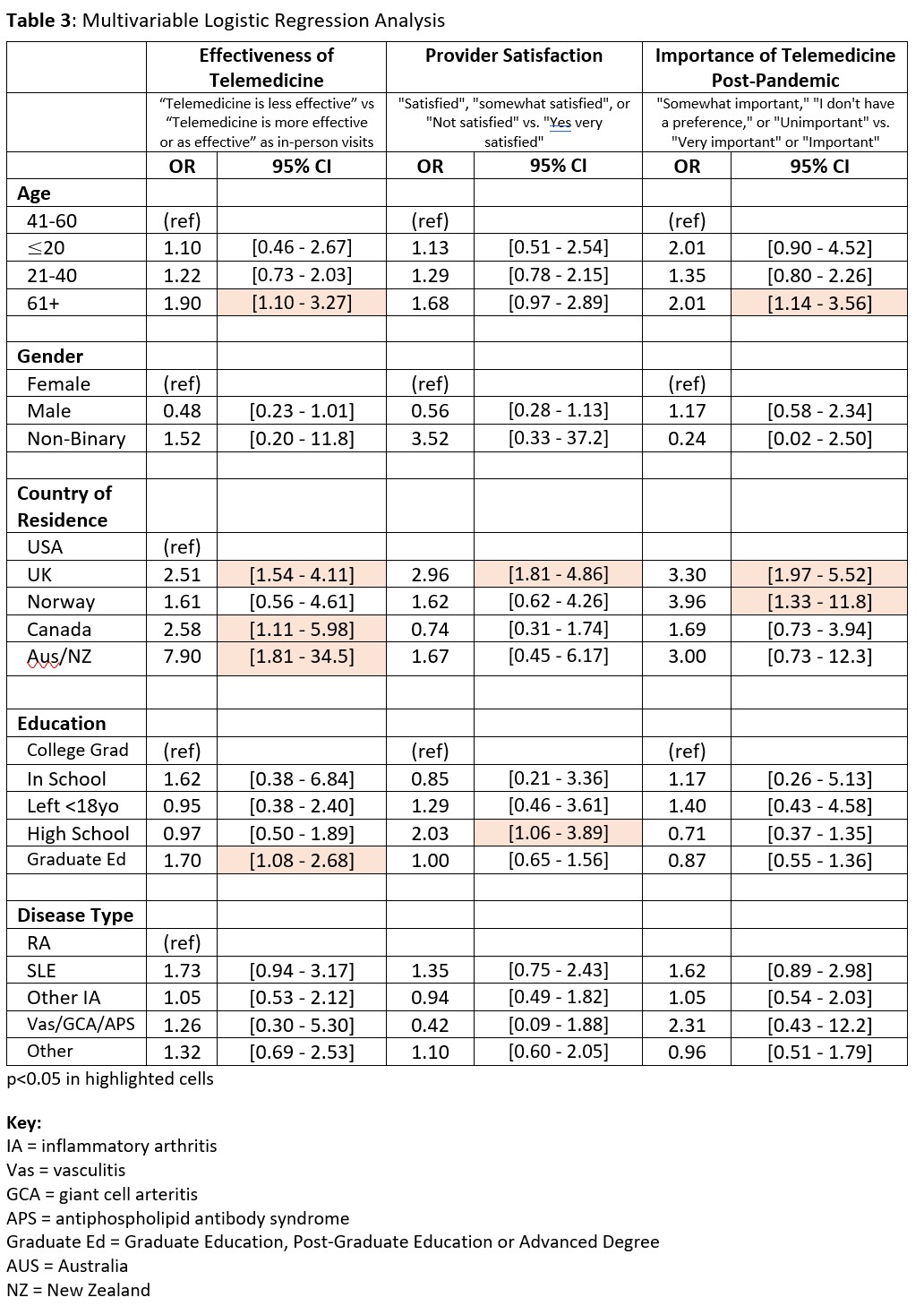Session Information
Date: Tuesday, November 9, 2021
Title: Abstracts: Patient Outcomes, Preferences, & Attitudes (1909–1914)
Session Type: Abstract Session
Session Time: 3:00PM-3:15PM
Background/Purpose: During the COVID-19 pandemic, healthcare systems rapidly expanded telemedicine to ensure continued access to care. Few studies have explored patient perceptions of the telemedicine experience during the COVID-19 pandemic. The aim of this study was to better understand patient perspectives related to telemedicine use, including effectiveness and barriers of telemedicine use.
Methods: The COVID-19 Global Rheumatology Alliance (C19-GRA) Patient Telemedicine Survey was an anonymous, cross-sectional online survey of participants with rheumatic and musculoskeletal diseases (RMD) from December 2020 to May 2021. Information on diagnoses, demographics, socioeconomic status, and respondents’ perspectives on benefits and limitations of telemedicine use were collected. Data were summarized with descriptive statistics. Multivariable regression models adjusted for age, sex, country, disease type, and education level to perform relative risk estimates for dichotomous outcomes.
Results: The cohort included 596 respondents, of which 87% (514) were female, 47% (281) were 41-60 years of age. Race and ethnicity data were only collected for U.S respondents in which 81% (211) were white (Table 1). Common diagnoses were SLE (33%, 196) and RA (21%, 125). Most respondents were from the USA (44%, 262) or the United Kingdom (32%, 190). 79% (468) had completed a college or university degree or higher.
Of the 78% (467) respondents who used telemedicine during the pandemic, 65% (305) used audio (telephone) and 52% (242) used video (Table 2); about 70% (323) reported no problems when using video for telemedicine visits. 61% (283) found telemedicine effective compared to in-person visit and 40% (186) reported it would be important after the COVID-19 pandemic.
After adjusting for age, sex, country, disease type, and education level, UK respondents were more likely to report lower satisfaction with telemedicine care by their rheumatologists during the COVID-19 pandemic compared to US respondents. Those in high school were more likely to report lower satisfaction with telemedicine care compared to college graduates. Groups that rated telemedicine as less effective in their rheumatologic care included people over 60, respondents from the UK, Canada and Australia/New Zealand, as well as participants with graduate level education. Groups that reported post-pandemic telemedicine use as less important in their care included people over age 60 and respondents from the UK and Norway (Table 3).
Conclusion: The majority of patients with rheumatic disease found telemedicine as effective or more effective than in-person visits, with about half of the respondents reporting telemedicine as helpful when disease is stable or alternating with in-person visits. However, over a quarter of respondents said telemedicine would not play a role in their care after the pandemic and preferred only in-person visits post-pandemic. These patient preferences can help inform policy decisions related to ongoing telemedicine use and insurance coverage of telemedicine visits.
To cite this abstract in AMA style:
Maheswaranathan M, Miller B, Harrison C, Sinha R, Egeli B, Degirmenci B, Sirotich E, Grainger R, Hausmann J, Liew J, Chock Y. Patient Perceptions of Telemedicine Use in Rheumatology Clinics During the COVID-19 Pandemic: An Analysis from the COVID-19 Global Rheumatology Alliance [abstract]. Arthritis Rheumatol. 2021; 73 (suppl 9). https://acrabstracts.org/abstract/patient-perceptions-of-telemedicine-use-in-rheumatology-clinics-during-the-covid-19-pandemic-an-analysis-from-the-covid-19-global-rheumatology-alliance/. Accessed .« Back to ACR Convergence 2021
ACR Meeting Abstracts - https://acrabstracts.org/abstract/patient-perceptions-of-telemedicine-use-in-rheumatology-clinics-during-the-covid-19-pandemic-an-analysis-from-the-covid-19-global-rheumatology-alliance/



